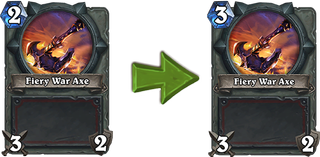
Earlier this week, Blizzard announced that a slate of pretty significant balance changes would be coming soon to Hearthstone. Among those changes is a nerf to the Warrior card Fiery War Axe. The change takes one of Warrior's hallmark weapons—sometimes affectionately referred to as "Fiery Win Axe"—and bumps it from an outstanding, game-winning card to one that is still good but much more middle of the road.

In the developer notes for the change, Blizzard said it considered lowering the attack of War Axe to 2, instead of changing its mana cost, but "that change didn’t feel intuitive enough."
Changing the attack of War Axe to 2 instead of its mana cost to 3 is largely considered a better change to the card, as it would maintain some of the tempo Warrior needs in a slot that is otherwise relatively weak for the class. The main reason for the change is the prevalence of Pirate Warrior, and while this cripples that deck significantly, it also hurts Warrior in the long term.
nerfing war axe around aggro deck that rotates out in 8 month but crippling all other archetypes forever. also reasoning is just insultingSeptember 5, 2017
But even moreso, the wording didn't sit right with the Hearthstone community.
"Generally, changing the mana cost of a card is less disruptive, because you can always see the mana cost of cards in your hand," the developer's notes read.
Many took this to mean that Blizzard thought the community was stupid, however Hearthstone game director Ben Brode today told GamesBeat that is not at all the intention.
"Some of what I read in the community response seems to be a core misunderstanding that we are nerfing cards because we think players are confused by them (and therefore we think players are stupid). I want to be super-clear — these cards are being nerfed for power level reasons, or because we are curating the set of evergreen cards to help Standard feel fresh and more fun with our yearly standard rotation. The language about certain changes being more disruptive than others was related to why we decided to make one change over another, once we’d already decided to make a change," Brode said. "We absolutely don’t think players are stupid."
The biggest gaming news, reviews and hardware deals
Keep up to date with the most important stories and the best deals, as picked by the PC Gamer team.
Brode went on to explain that the reasoning for the change is quite the opposite: many players have memorized hundreds or even thousands of cards, and can recall their exact text by only looking at the card art. He mentions Arcanite Reaper, saying most players probably don’t have to read the card to know that it’s a 5/2 weapon.
Nobody double-checks Arcanite Reaper to make sure it’s still a 5/2 weapon each time they cast it. That’s nuts.
Ben Brode
"Art becomes a shortcut to game mechanics," Brode said. "When we change the underlying game mechanics without changing the art, players who don’t read their cards every time they play a game won’t notice that one of the words on the cards has changed."
Going back to the Arcanite Reaper example, Brode mentions how no one double-checks to make sure it's still an 5/2 weapon each time they cast it.
"That's nuts," Brode said. "That’s why it’s less disruptive to change mana cost than Attack, Health, or card text. The card is literally not castable or highlighted green any more, and that makes it obvious that a change has been made to players who have every card memorized."
The reasoning makes sense—I know I would be caught off guard if I cast Fiery War Axe, ready to kill a 3-health minion, only to find it could only swing for 2, whereas a change to the mana cost is more explicit. Having said that, I think that one little bit of dissonance would quickly go away. Just as players have the capacity to memorize thousands of cards' text, we have the capacity to re-learn new card texts as well.
As the former head of PC Gamer's hardware coverage, Bo was in charge of helping readers better understand and use PC hardware. He also headed up the buying guides, picking the best peripherals and components to spend your hard-earned money on. He can usually be found playing Overwatch, Apex Legends, or more likely, with his cats. He is now IGN's resident tech editor and PC hardware expert.
Most Popular






